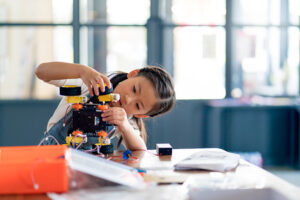5 tips to get the most out of parent-teacher night

Whether it’s mid-year or end of year for your child’s school, Australia-wide parents will have millions of interactions during parent-teacher night. Parents are an integral part of the education journey, and parent-teacher night is a key touchpoint for them to get involved and receive direct feedback and be able to ask questions that they otherwise can’t of a static classroom report.
Many might agree with Diana—Victorian mother of two primary school aged children—who said: “I feel that school reporting isn’t quite enough for me, so this one-on-one opportunity at parent teacher meetings is super important for me to extract those gems I need to know so I can help my child progress”.
COVID-19 has moved the goalposts on education
The most recent and upcoming parent-teacher nights will be more crucial than ever given the continued disruption for schools nation-wide. A lot has been said about parent and teacher relations in the wake of COVID-19, which brought immense pressures on schools and teachers as well as on parents. Some say the pandemic has improved these relationships, others say it has strained it – although overall parents have discovered a far deeper respect for and appreciation of teachers and their skills. In any case, both parents and teachers found themselves on new ground in these circumstances.
One thing that experts do agree on is that nurturing good parent-teacher relationships is vital to a child’s progress. However, life is sometimes busy for parents. Between the responsibility of providing for the family (some even juggle multiple jobs), household chores, caring for relatives, dealing with personal challenges and making sure there is adequate rest, there really is a lot on parents’ plates.
So, as a parent, how can you best prepare for and feel confident about these important parent-teacher nights? Given the face-time with each teacher often lasts only 10 to 15 minutes, it’s worth ensuring that you get the most out of this precious time.
We took to the community and asked parents of both primary- and secondary-school children for their tips on how they prepare before the night.
1. Start with the three Ps: Prepare, Prioritise and Probe
Parent-teacher sessions always seem to fly by. Between the friendly welcome and the unofficial formalities, not much time is left and it can get overwhelming to remember your key concerns or questions in the moment. The parents we spoke to recommended the three Ps: Prepare, Prioritise and Probe.
Prepare to take some quiet time out, perhaps at the end of a day after your children have gone to bed, to start jotting down the questions you’d love answered. Diana says: “For me, this includes questions like:
- What would be the top thing my child needs to improve on over the next six months?
- What can I specifically do at home to help my child address this or any other challenges?
- What is my child particularly excelling in and how do I encourage it?
- How does my child behave in class? Do they participate?
- How does my child interact with other children? Have you observed any issues?
Prioritise these questions to make sure you have a chance to ask the most important ones in your allotted time.
Probe deeper. If you receive general feedback such as: “They’re doing well” ask: “What makes you say that?”
2. Ask your children what they think
It can also be helpful to involve your children ahead of time. Sit down with them individually and ask them about their year, such as which subjects they find easy, which ones they struggle with, and what they think they need to work on.
Remember to ask them environmental questions such as whether they’re dealing with any challenging social situations. You’ll be surprised with how much valuable information surfaces from a five-minute chat.
Sam, a father of two high-school children and one in primary school in New South Wales, says: “Our high-school kids have multiple teachers, so we ask how they’d rate each subject. This gives me something to discuss with each teacher. If my kids feel as though they’re struggling with something, I’ll ask that teacher what I can do as a parent to help.”
3. Ask the opinion of those who interact with your children
Our parents said they see the value of outside perspectives from others in their kids’ lives, such as grandparents, carers or tutors. “They say that it takes a village to raise a child,” says Sam. “I ask my tribe, including my own parents, who have a lot to do with my kids. Getting their perspective on anything they may have noticed is so helpful.”
4. Focus on any concerns related to COVID-related disruption or home-schooling
Learning from home affected students differently. Some enjoyed the opportunity to have one-to-one education at a distance, whereas others needed and greatly missed in-person social interaction – although they typically did well academically they found that they struggled to focus outside of a classroom setting. A communication in late 2021 by the Hon. Alan Tudge MP, Minister for Education and Youth, highlighted this:
“We should all take heart from the NAPLAN results released in August this year. They showed that after a year of disruptions, Australian students had not fallen behind, on average. I remain concerned, as do many others, that these headline results don’t tell us the full story. For many kids, remote schooling has been exceptionally hard. The mental health impact has been devastating.”
The parents we spoke to specifically mentioned discussing with teachers the effect COVID disruption and home schooling has had on their children’s education. Diana says: “I’ve seen my children suffer. They’ve missed their friends. They’ve missed a lot of the practical and interactive activities. Of course my husband and I wonder how this has affected their education. This year’s assessment data will be of particular interest to us. We’d like to see the impact of the pandemic on their learning.”
5. Write it down rather than relying on your memory
Pack a pen and notepad or bring a tablet device because, no matter how much you’d like to, the reality is there’s a lot to take in, and it’s unlikely that you’ll be unable to retain or relay all the advice you receive.
“I can easily forget things teachers have suggested, so I jot things down in my phone’s notepad. I have to do it while it’s still fresh, otherwise life gets in the way, and by night time I have forgotten the key points,” says Diana.
If you do find yourself relying on your memory in a parent-teacher meeting because you don’t have any way to take notes, take the opportunity to email the teacher for clarification later. Diana says: “I like that at our school I know that at any time of the day you can email the teacher directly. So, if I’ve missed something during the parent-teacher meeting, I just email them. There’s a lot more open communication these days because of technology.”
Parents are an integral part of the education journey
It’s never too late to empower yourself as a parent and get the most out of parent-teacher nights. Any investment you make to get the most out of those 15 or so minutes with your child’s teacher will not be wasted. It’s an investment in your child’s future.
Diana sees herself as playing a vital role in their child’s education. “I know education is a team effort; it is a mixture of school-based but also home-based,” she says. “These are the special years my child gets to create a solid foundation in their lives. I know this helps set them up for the future, and I want to make sure I’m doing everything possible to help”.
Sam agrees: “Having experienced home-schooling during COVID, I can now attest that it isn’t easy to keep three school-aged kids on track and focussed. I can only imagine what it’s like to be a teacher.”
Parent-teacher nights create a necessary one-to-one link needed for parents to find out how their children are performing and how they can be supported at home. Education departments are embracing diagnostic assessments that can pinpoint any learning loss, while some schools are looking to global-data based scales to benchmark the impact of COVID disruption or other factors on their students’ progress. It means that the advice teachers are able to bring to parents during parent-teacher interactions is highly valuable.
If you’re keen to ask your child’s teachers more about how they measure progress or learning loss, you can find out about the main different types of school assessments and what they can pinpoint.



